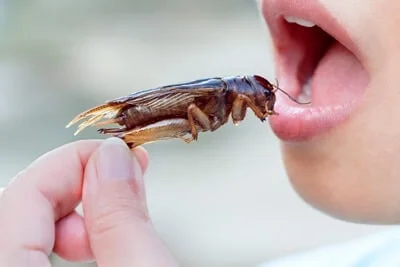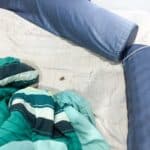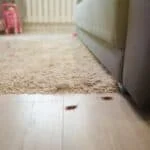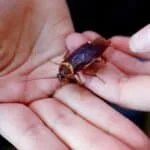The thought of a cockroach in your mouth while sleeping is horrifying. Roaches carry pathogens and bacteria that are responsible for several diseases. If a cockroach gets into your mouth, you’re likely to become ill.
It’s unlikely that a cockroach would crawl into your mouth. Roaches know not to get too close to humans, so crawling into a human’s mouth puts them in danger. However, if you stray too close to a nest, there’s always a chance that a flying roach could fly into your mouth. If you accidentally swallow one, your stomach acid would digest the insect and the harmful bacteria.
You can keep cockroaches away from you when you sleep by using natural repellents, such as catnip or essential oils of scents that roaches hate. Keep your bedroom free from clutter, food, and dirt to reduce the chances of cockroaches getting in and crawling into your mouth at night.
Do Roaches Go in Your Mouth?
There’s an urban legend that describes how we unknowingly eat insects while we sleep. Fortunately, as mentioned, cockroaches are unlikely to go in your mouth, even when you’re sleeping.
Even though mouths are warm and moist, cockroaches are wise enough to stay away from them. That’s because the constant exhalation of CO2 clearly indicates that a living thing is on the other side, warning cockroaches of danger. When cockroaches come out from the hiding spaces, they scavenge for:
- Food
- Water
- Shelter
- Warmth
Mouths only offer a couple of these things, so it doesn’t benefit cockroaches to go inside one. However, if they’re starved of food or water, the moisture produced by a mouth may be enough to keep them alive.
What’s more likely to happen is that a cockroach accidentally flies into your mouth when you’re too close to the nest. Flying cockroaches include:
- Asian
- Brown
- Smoky-brown
- Wood
- American
Again, however, this is rare as roaches don’t really emerge when humans are present. Cockroaches are more likely to crawl inside ears because the ear canal is warm and offers protection. Roaches are also thigmotropic. They’re responsive to touch and enjoy the feeling of things against their bodies. That’s why they squeeze and nestle into the tightest spaces.
What Happens If You Accidentally Swallow a Cockroach?
Even though it’s unlikely for a cockroach to get inside your mouth, you have every right to be worried about what would happen if one were to wriggle in. The good news is that your stomach acid would dissolve the cockroach and the bacteria it carries in most cases. Your body will then digest it, where it’ll exit the body through your feces.
However, if your stomach acid doesn’t work quickly enough to dilute the bacteria, you could get sick. Unfortunately, if you’re allergic to cockroaches, you’re at the biggest risk of becoming unwell. According to the American College of Allergy, Asthma, and Immunology, you may develop the following symptoms after swallowing a roach:
- Swelling of the face, throat, and mouth
- Breathing difficulties
- Dizziness
- Drop in blood pressure
- Coughing
- Nasal congestion
- Wheezing
- Ear and sinus infections
- Skin rashes
Cockroaches are known to trigger asthma. Their feces and saliva contain specific proteins that act as allergens in people with asthma, causing a reaction after they swallow the bug. Other diseases caused by either swallowing a cockroach or one entering your moth include:
- Salmonellosis, a condition caused by the Salmonella bacteria that produces vomiting, fever, and diarrhea
- E. coli infections, which affect the gut and cause nausea, fever, muscle cramps, and chills
- Listeriosis, a bacterial infection that attacks weakened immune systems and causes diarrhea, fever, and muscle aches
If you become unwell after a cockroach has been in your mouth, seek medical advice to prevent the health condition from getting worse.
How To Keep Cockroaches Away While You Sleep
If you’re worried about cockroaches getting into your mouth while you sleep, particularly if you know you have an infestation, there are several things you can do to keep them away from you at night.
Roaches are more likely to appear under the cover of darkness where it’s quiet and safe from predators, so you’re more vulnerable when you sleep. Thankfully, you can keep cockroaches away with these steps:
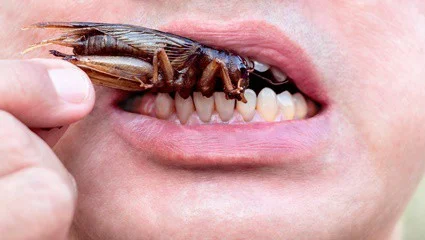
Remove Food and Moisture
As mentioned, food and water attract cockroaches. Before you go to bed, clear your bedroom of any crumbs, leftover food, and cups. If you take a glass of water to bed with you, put it in a watertight bottle that roaches can’t get into.
If you provide cockroaches with the sustenance they need to survive, they’ll keep coming back to your room time and time again. The best way to keep cockroaches out of your room is to never eat in there at all, although we recognize that in many cases that this is unrealistic.
Clean Your Room
Cockroaches will use dirty clothes and clutter as hiding spots. They even eat paper, cardboard, fabric, and any other items containing starch. Therefore, keep your room as clean and clutter-free as possible by:
- Putting away any loose clothes
- Dusting down the sides
- Sweeping or hoovering the floor
- Remove loose items from the floor
Leaving your room dirty attracts cockroaches into your room, making them more likely to wander into your mouth during a visit.
Empty the Trash
Similar to cleaning your bedroom, be sure to take out any trash you’ve accumulated throughout the day to keep roaches away. Similarly, never leave rotten foods in your bedroom trash can, as the pests will feast on it, coming back every night for more.
Seal Doors and Windows
Another way to keep cockroaches away from your bedroom and minimize the chance of one getting into your mouth is to seal all entry points. Cockroaches gain access through:
- Small holes in the walls
- Cracks in the baseboard
- Open windows
- Gaps underneath doors
Filling in holes and cracks and keeping your doors and windows closed helps keep cockroaches out. Installing a weather strip or door bottom to cover the gaps under your doors is also an effective way to remove a cockroach’s access into your room. Similarly, if you have an air conditioning unit, frequently check it for signs of roaches.
Use a Natural Repellent
Even though you won’t want cockroaches getting into your mouth, you probably won’t want to use harmful chemicals in your bedroom, especially if they affect your sleep. That’s why you should consider a natural repellent instead. Cockroaches hate the smell of:
- Catnip
- Peppermint
- Eucalyptus
- Rosemary
- Oregano
- Lemon
- Cedarwood
- Cypress
- Bay leaves
Many of these scents are found in essential oils, which can boost your natural health and well-being. Some even aid with sleep, so they can be beneficial in multiple ways. Place them next to your bed at night to keep cockroaches away from your mouth.
Gel Repellents
If natural cockroach repellents don’t work, you’ll need to choose something more effective. Gel cockroach baits are efficient at killing cockroaches quickly. They eat the gel bait and go back to their nest, where they die. Roaches consume their dead kin, so the whole colony eventually succumbs.
Place a few gel baits in places where cockroaches are likely to hide and emerge, such as under your bed and behind cabinets.
While having a cockroach in your mouth is an unpleasant prospect, it’s rare. Take due diligence at night to keep the pests away from you and keep your home as clean as you can to keep the pests away in the first place.
